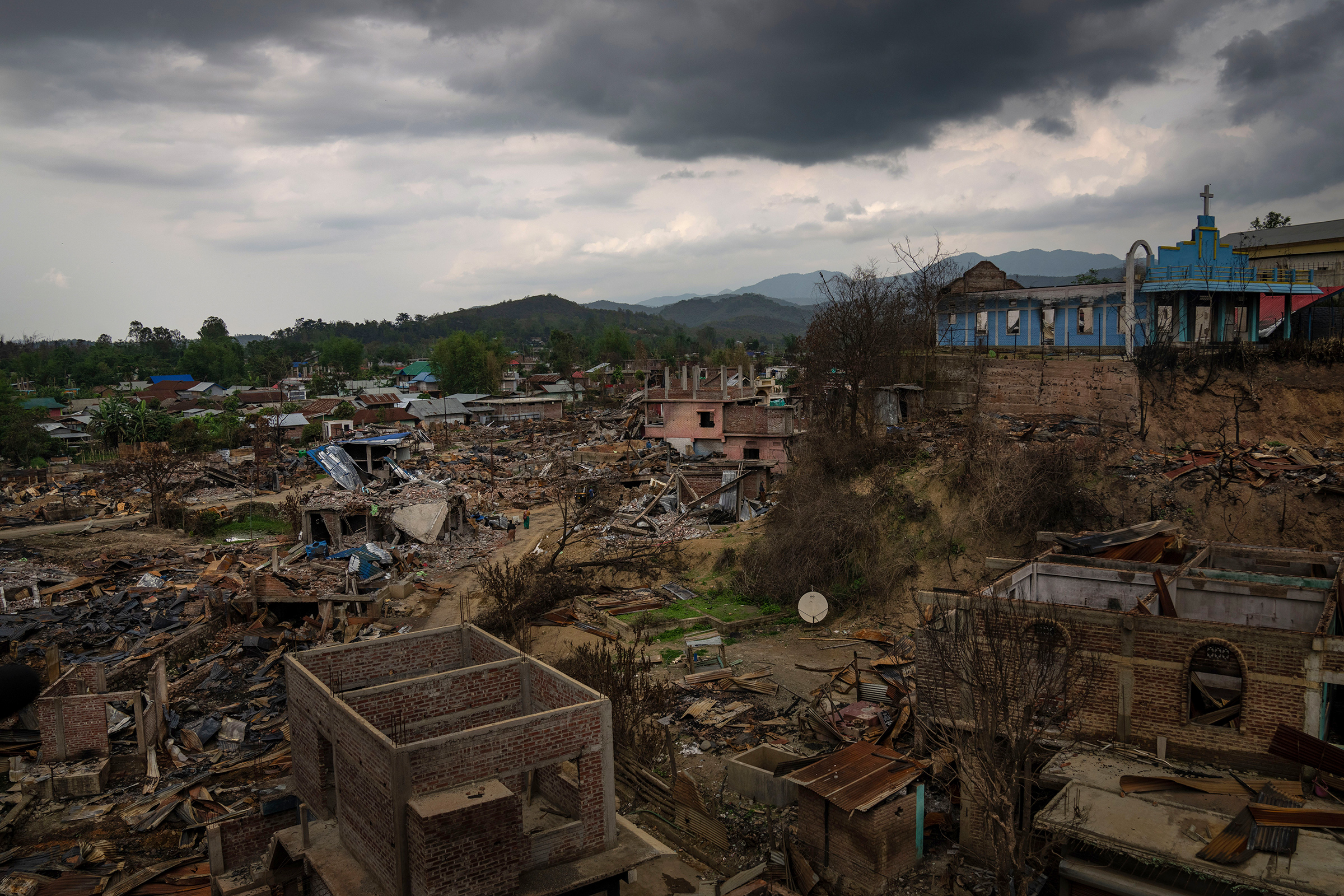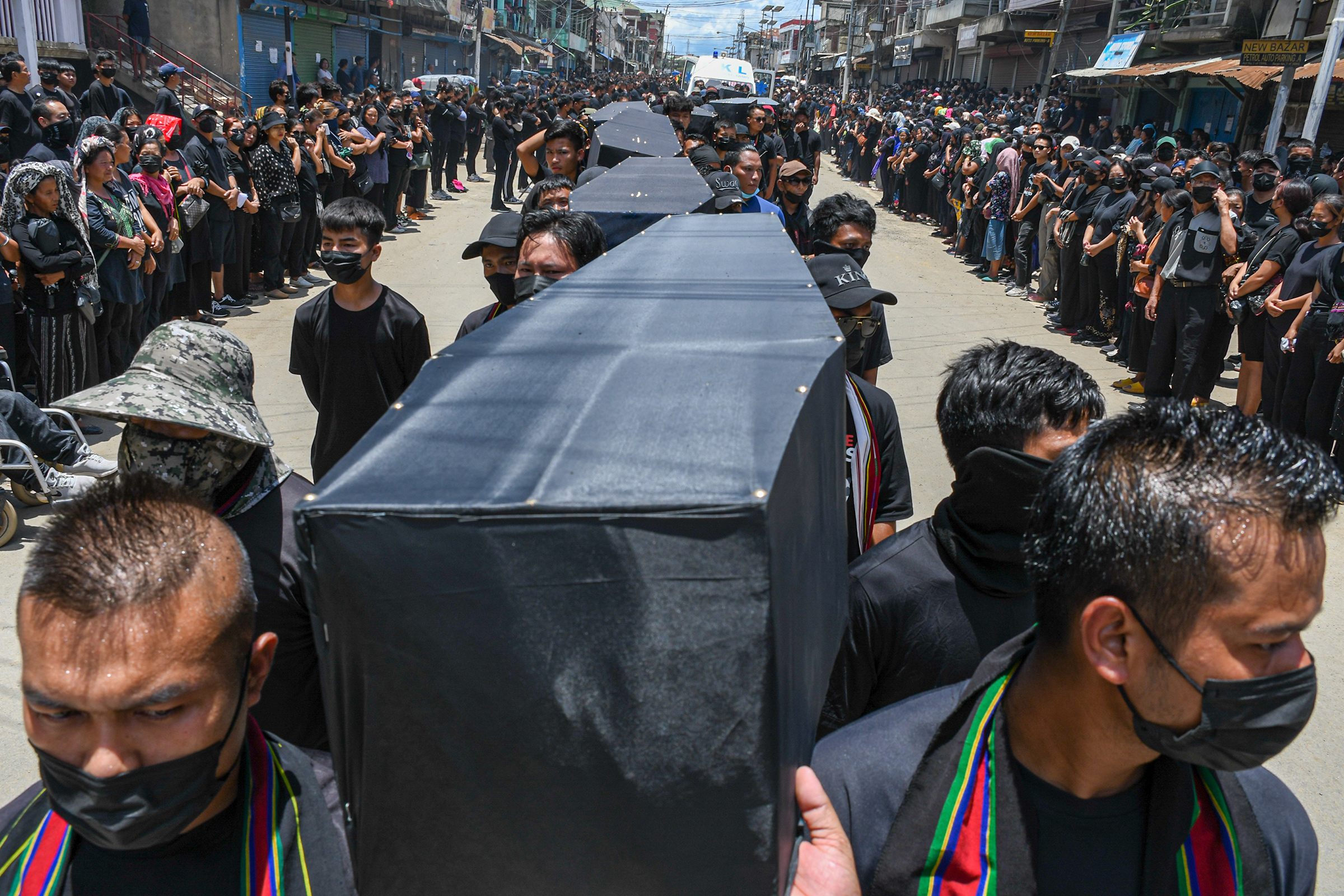The Indian state of Manipur is on the verge of civil war. In the last few weeks, more than 250 churches have been torched, more than 100 people killed, and more than 40,000 people displaced. Yet Prime Minister Narendra Modi hasn’t said a single word in public about it—let alone visited the conflict-ridden region.
The world has largely remained silent about the unrest in Manipur between the predominantly Hindu Meitei, who form a bare majority in the state, and the mostly Christian Naga and Kuki tribes.
My organization, Hindus for Human Rights, is doing all we can to wake the world up to the crisis in Manipur and the broader threat to democracy in India. We mobilize Hindus to draw on the pluralistic teachings of our faith and oppose the Hindu nationalism of Modi and his Bharatiya Janata Party (BJP) government. We co-led a protest at the White House during Modi’s visit to the United States last month, at which members of the heartbroken Manipuri diaspora asked, “Modi, Biden, are you listening? Is anybody listening?”
A member of the Kuki tribe cries during a sit in protest against the killings in their northeastern home state of Manipur, in New Delhi, on May 29.
Manish Swarup—AP
A group of women representing Meitei society hold torches demanding the restoration of peace in Manipur state in Imphal on July 10.
AFP/Getty Images

Dozens of houses are seen vandalized and burnt following ethnic clashes and rioting in Sugnu, in the northeastern Indian state of Manipur on June 21.
Altaf Qadri—AP
It is for these reasons that we are encouraged by the European Parliament’s decision on Wednesday to “urgently” discuss the crisis in Manipur, with a vote on a resolution expected on Thursday. This is a welcome development at a time when French President Emmanuel Macron is expected to roll out the red carpet for Modi in Paris during his state visit from July 13 to 14 to mark Bastille Day, and following weeks of silence from world leaders as Modi traversed the globe with trips to Australia, Egypt, Japan, Papua New Guinea, and the U.S.
For those unfamiliar with the current crisis in Manipur, it reflects the complex dynamics at the heart of India’s easternmost state. Manipur joined India in 1949, over the objections of many Manipuris, especially in the Naga community. It has experienced secession movements, ethnic rivalries, and serious human rights violations by Indian security forces and the military ever since then.

Residents of Churachandpur take part in a silent march while carrying dummy coffins to commemorate all the tribal people who lost their lives in the ethnic clashes in Manipur on June 23.
Biplov Bhuyan—SOPA Images/LightRocket/Getty Images
While Hindu nationalism was not the original cause of Manipur’s problems, it’s certainly exacerbating things now. The most recent wave of violence came in April after Manipur’s High Court upheld a BJP-led state government policy to grant Meiteis “Scheduled Tribe” status. This policy would grant the non-tribal community constitutional rights reserved for the minority Naga and Kuki tribes, especially access to land. Naga and Kuki community leaders fiercely oppose this proposal, and argue that it would defeat the purpose of acknowledging historically marginalized groups.
Over the past two months, protests against this policy have spun into a series of violent attacks, reprisals, and even calls for war. Neither the BJP-led state government nor the central one has provided meaningful support to the countless Manipuris caught in the violence.
Lilapati Devi, 55, from the Meitei community, mourns by the grave of her husband A. Ramesh Singh, who was killed by a mob of tribal Kukis in Phayeng, Manipur state, on June 22.
Altaf Qadri—AP
A shopkeeper stands next to a poster criticizing the silence from Prime Minister Narendra Modi following ethnic clashes and rioting, in Imphal, the capital of Manipur state, on June 22.
Altaf Qadri—AP
Now, in response to the European Parliament’s deliberations on Manipur, the Indian government has retained a European lobbying firm, which has urged the European Parliament to discuss the matter with India before any resolution is passed. Modi neither wants to publicly discuss Manipur nor have Europe discuss it.

Zuan Vaiphei, 32, left, an armed tribal Kuki, keeps a watch on rival Meitei community bunkers, along a de facto frontline which dissect the area into two ethnic zones in Churachandpur, in the northeastern Indian state of Manipur on June 20. Two months ago, Vaiphei was teaching economics to students when the simmering tensions between the two communities exploded.
Altaf Qadri—AP
That’s why Macron should raise the matter during Modi’s visit to Paris. The European Parliament’s deliberations add political cover to Macron for a diplomatically sensitive visit. And raising the matter is in the spirit of Bastille Day, which marks the beginning of the French revolution and France’s transition to liberal democracy.
Promoting liberté, égalité, and fraternité—the motto of the French revolution—is the non-negotiable duty of every French leader. Macron, who is on shaky ground over the police killing of a teenager and ramming through an unpopular hike in the retirement age, has a chance to demonstrate his commitment to liberalism and democracy by pushing Modi to end his silence on Manipur. The ball is in Macron’s court on Bastille Day.
More Must-Reads From TIME

